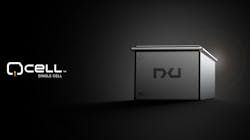Atlis to Rebrand and Begin Selling Battery Packs
Atlis Motor Vehicles Inc. executives have put on hold development of an electric pickup truck to focus the company’s efforts more narrowly on battery technology. They paired that announcement with a name change. The primary reason for the change to Nxu (pronounced “new”), President Annie Pratt said, was because Atlis felt “limiting.”
“Atlis Motor Vehicles is a name and a brand that has gotten us to where we are, but it doesn’t serve us anymore,” Pratt said during an online presentation earlier this week.
For years, Atlis has promised a pickup truck with a low charge time because, as CEO Mark Hanchett said, the company was built on the premise that “the most important thing that you have is time.” In 2018, Atlis demonstrated this approach with a battery pack with a full charge time of just under 13 minutes.
“In building this energy-focused vertical around the idea that we’re solving problems from a solutions perspective, we’re bringing a solution to market, not necessarily just launching a truck,” he said this week.
Pratt seconded the statement, saying that while the company still plans to deliver a truck at some point, it first must focus on building the foundation and energy platform to make it viable.
Nxu’s official Youtube account still made it clear that plans for the long-awaited XT electric pickup haven’t been scrapped altogether. The 600-horsepower truck was first announced in 2020 and intended to be a work truck potentially capable of towing up to 35,000 pounds, sporting a range of up to 500 miles, and weighing in at 20,000 pounds before add-ons. The price ranged from $45,000 to $80,000 depending on trim.
“The truck story is not over,” an official said in the chat accompanying this week’s event. “To get to production of the pickup, we must continue to develop and produce our battery technology – which will support our vehicle program. That does not mean we are abandoning the truck, rather we are working to perfect the vehicle from the inside out.”
Hanchett and Pratt outlined how they intend to achieve an energy-abundant future and remove the “bottleneck” that has made it harder to access:
- Generate, store and manage energy.
- Deliver energy.
- Scale and make that energy available to everyone.
For now, they’re focused on the first 5% of that plan: building better batteries. Specifically, Nxu’s Qube battery pack.
“[The Qube] is fundamentally different from what you’re used to in the market. They’re available for mobility solutions and scale to grid level, what we call Qplus, as well as a long-term strategy focused on how we deliver that energy to your home, your business, charging, and infrastructure,” Hanchett said.
The Qube will address problems faced by current battery technology, namely low range and long charge cycles, the executives said. It is powered by the company’s proprietary technology, the Qcell, a multilayer pouch cell that will go into low-volume production this summer, allowing Nxu to ship its first battery packs to an unnamed off-highway equipment customer. This marks a milestone in the start-up’s history as it will be its first potential revenue-generating product (The company last year lost $71 million.)
But the Qube isn’t the end of the story. The next step is 1.5-megawatt charging, which Atlis/Nxu demonstrated at the end of February. No EVs are currently capable of such a charge level, although Tesla has announced that its semi, one of the largest EVs on the market, would soon do so. The chargers will also deploy this summer, potentially giving Nxu two revenue streams.
“This is a huge deal for us,” Pratt said, “We are finally getting to the point where, in the foreseeable future, [we’re] getting revenue on the book and product in the field.”
Shares of Nxu (Ticker: AMV) dropped 9 cents to 52 cents following the announcement, adding to a nearly 97% decline from an October high of $15.70, a month after the company completed an IPO. Nxu’s market capitalization is now about $17 million.
